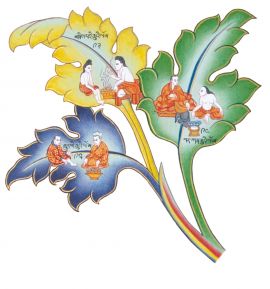Tibetan Medicine
Tibetan Medicine is a holistic system that honors the deep interconnectedness between the body, mind and external environment. Each of these areas must be addressed to live a harmonious, healthy life.
Tibetan Medicine was first taught by the historical Buddha—Buddha Shakyamuni—around 2500 years ago in the third turning of the Dharma Wheel. It is one of the world’s oldest medical systems, and yet its principles remain as true and relevant today as ever. In fact, Tibetan Medicine has a great deal to offer us in the modern world with its understanding of emotions and how they affect our body systems in very real ways.
Outer, Inner and Secret Elements
We will explain briefly here how it is that the body, mind and environment are so deeply interwoven. First, we need to know a bit about the elements. The Tibetan view is that all phenomena in existence are composed of the five elements of space, wind, fire, water and earth. The external environment is composed of them, as well as our bodies and the qualities of our mind. The elements are particular energetic qualities that, in their denser states, also take on their familiar forms. Wind has the quality of movement. Fire has the quality of heat and transformation. Water has the quality of fluidity and cohesion. Earth has the quality of solidity and stability. And space is the balance of the other four elements. It is responsible for creating separation—space—between things.
The outer elements are our external environment. This is the soil, rivers, winds, etc., that we are familiar with, as well as the atmosphere. The air that we breathe contains the five elements, and their balance shifts in a 24-hour cycle, which in turn affects the quality of our breath.
The inner elements are the composition of our bodies. Basically, earth element is our muscles and bones. Water element is the liquids in our bodies. Fire element is our inner temperature, our metabolism and the catalyst for chemical reactions. Wind element is the breath, the firing of neurons and the flow of thoughts. And space is what keeps everything in its proper place, enables the openness between the cells, as well as the hollowness of the intestines, and so on. In Tibetan Medicine, the composition of the body is further described as the seven constituents. These are: nutriment, blood, flesh, fat, bone, marrow and essence.
The secret elements are the characteristics of our mind. There are 80 different emotions, but for the sake of simplicity, we can say that negative emotions conclude in these five: ego-pride, attachment, anger, jealousy and ignorance. It is an impure state of the five elements, earth, water, fire, wind and space, respectively, that cause these emotions. When the elements are purified and balanced, these emotions become more pure and manifest as devotion and calmness, altruism and selflessness, patience and compassion, appreciation and love, and generosity and equanimity.
The Three Humors
Tibetan Medicine deals much more directly with the so-called three humors—bile (tripa), wind (lung) and phlegm (beken). These are the vital substances of the body and, collectively, they are responsible for all bodily functions. The three humors seamlessly weave together the gross, physical level of the body and the subtle, mental level.
The humors, like all things, are composed of the elements. Bile is the fire element, wind is the wind element and phlegm is the earth and water elements. There are five types of each humor, each with a specific location and function. When these humors become out of balance in relation to each other, being deficient or excessive, disease begins to occur.
The three humors are what enable our bodies to function, but since they can so easily become imbalanced, they also carry the seed of disease within our bodies. For this reason, in Tibetan Medicine, we say that we all have unmanifested disease within us. As soon as the cause and condition are there, disease will manifest.
The three humors are also linked to the three mental poisons. When bile is out of balance it causes anger. When wind is out of balance it causes attachment. When phlegm is out of it causes ignorance, or delusion. For this reason, imbalances in the mind and emotions directly cause imbalances in the body systems. Negative emotions cause disease.
Therefore, healing the body also means healing the mind. If someone is always angry, no matter what we do to treat the liver, if the anger is not treated, the liver will continue to suffer.
This is why in Tibetan Medicine we say that whatever is beneficial is medicine, and whatever causes suffering is disease. The health of the body depends on the mind, so it is important that we take care of our happiness. When we are ignorant, we continue to cause problems for ourselves and others. We perpetuate the cycle of suffering and we become sick. We need wisdom. Wisdom tells us how to care for our bodies and minds. The ultimate wisdom is love.
Of course, there is much more to Tibetan Medicine. The primary texts on Tibetan Medicine are called “The Four Tantras.” These are the Root Tantra, Explanatory Tantra, Oral Transmission Tantra and the Last Tantra. They go into great detail about the functioning of the body, the diagnosis of disease through the pulse and urinalysis, the treatment of disease through herbal medicines and specific modalities such as moxibustion and cupping.

